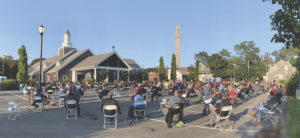PROVINCETOWN — Dept. of Public Works Director Rich Waldo said it is possible to fix the flooding that has for decades impeded pedestrians, harmed businesses, and damaged cars at the corner of Court Street and Shank Painter Road.
But it’s going to cost $3.5 million, an expense on the warrant for the May 1 annual town meeting. That is the largest of five budget override requests on the 39-article warrant. It must pass by a two-thirds majority at the meeting and by a majority vote at the May 11 town election.

The $3.5-million debt exclusion would increase taxes on a home valued at $620,500 by $55.85 in the first year, according to Finance Director Josee Young.
Court Street floods because of wetlands being filled decades ago, though exactly what happened remains the subject of rumors, Waldo said. The area is a perfect storm of poor drainage. The flat topography is low-lying, with groundwater just below the surface, near a wetland, and in a 30-acre watershed, Waldo said.
The giant puddles that last for days in front of Cape Cod Excavating, Cape Tip Seafoods, and BWell Holdings (formerly Fay’s Automotive) will require large pumps and pipes to move that water far enough away.
The proposed pumping station will take water from Court Street to the north end of Shank Painter Road, where it will go into a retention area at a proposed roundabout at the intersection with Route 6. The good news, Waldo said, is that the roundabout and water retention area will be paid for by the state as part of the $14-million reconstruction of Shank Painter Road.
The Shank Painter project is now fully funded and expected to go out to bid in 2023, Waldo said.
The retention area on Route 6 would direct overflow into Duck Pond following huge rainstorms, Waldo said. Duck Pond, north of Route 6, “is a very large wetland, so there would be no impact,” he said. “You will not notice the added water.”
The flooding has “plagued the town for a long time,” Waldo added, “and if the town is serious about getting rid of that problem, this is the way to do it.”
This fix would be game-changing for residents and business owners on Court Street. In 2017, Rita Silva, of 40 Court St., told the Provincetown Banner, “My husband is handicapped. He only has one leg and sometimes the water is so bad I can’t get him down our ramp. I have to push him through the water.”
Since then, the town’s DPW has started to pump as soon as there is a big rain, and “that has saved us,” Silva told the Independent this week.
Other Big Tickets
The town’s operating budget for fiscal 2022 is up 8.2 percent overall, though the size of the increase is deceiving because town staff kept the 2021 budget low, due to concerns about revenue shortfalls from the pandemic, Young said. The town’s $30.7-million budget is up by $2.3 million from the current year. But it’s only a $1.09-million or 3.7-percent increase over 2020, due mostly to fixed costs, she said.
The school budget of $5,126,441, however, is up 18.4 percent. Several factors are in play. First, the early learning center, which offers free child care and preschool for infants up to kindergarten is extremely popular and growing annually, said School Supt. Suzanne Scallion. Its costs are up by 17.5 percent to $581,657.
“We need to have our eyes wide open on how the early learning center has affected the school budget,” Scallion told the finance committee and select board in January.
Scallion and Mark Hatch, chair of the finance committee, have each said it’s time to talk about charging fees on a sliding scale so parents who can afford to pay help support the program.
The school budget increase is also due to the rehiring of a business manager, a job that had been done by the superintendent’s assistant for one year. But that proved unmanageable, said the superintendent. Scallion, who is not paid insurance benefits and works part-time, also saw a salary increase from $64,000 in 2021 to $82,000 in 2022.
Noting that the average full-time superintendent earned $140,000, school committee chair Eva Enos said, “I have no doubt she deserves every single penny. … The school committee is united in having trust in Suzanne.”
Lastly, the school committee is trying to protect money earned from school choice, that is, the tuition paid for out-of-district students. The former superintendent, Beth Singer, used school choice funds to offset expenses generally, Hatch told the Independent.
Scallion is preserving school choice for direct education enrichment costs, such as paying for music and theater staff, she said.
Last year, when all department heads had to tighten budgets, the school dept. used school choice funds to cover basic operating expenses. But that’s not their purpose, Enos said. This year, even though the school choice fund now has $566,000 in it, the department plans to use only $288,481 towards its budget and save the rest for unforeseen future costs.
Other Debt Exclusions
Other debt exclusion requests on the town meeting warrant include Article 10R, $410,000 for storm water improvements, with a first-year tax impact on a $620,500 home of $8.03; Article 10S, $530,000 for town building repairs, with a tax impact of $10.35; and Article 10U, $625,000 for a storm water or outfall program at Ryder Street, with a tax impact of $13.44.
